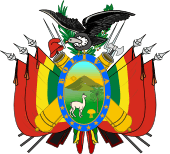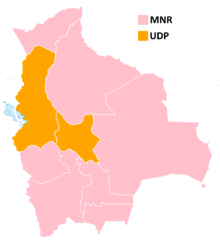1979 Bolivian general election
General elections were held in Bolivia on 1 July 1979.[1] As no candidate in the presidential elections received a majority of the vote, the National Congress was required to elect a President. However, the Congress failed to elect a candidate after three ballots, and instead selected Senate leader Wálter Guevara to serve as Interim President for a year on 8 August.[2] Guevara was later overthrown by a military coup led by Alberto Natusch on 31 October. Fresh elections were held in June 1980.
 |
|---|
| This article is part of a series on the politics and government of Bolivia |
|
Presidency
|
|
Legislative
|
|
Judiciary
|
|
|
|
|
Although the Democratic and Popular Union received the most votes in the Congressional elections, the Revolutionary Nationalist Movement-Alliance (A–MNR) won the most seats, largely as a result of the electoral system giving more seats to sparsely populated rural areas where the A–MNR was more popular.[3]
Background
General elections had previously been held in July 1978, the first since 1966, with several military coups taking place during the late 1960s and early 1970s.[1] Although Juan Pereda of the Nationalist Union of the People won the presidential elections, more votes were cast than there were registered voters.[4] After examining a number of allegations of fraud and other irregularities, the Electoral Court decided to annul the results on 20 July.[5] The following day, Pereda was installed as President following a military coup. Pereda himself was overthrown by yet another military coup in November, which saw General David Padilla assume the presidency,[6] promising to hold fresh elections in July the following year.[3]
Campaign
A total of 1,378 candidates contested the 144 seats in Congress.[3] Several alliances were formed for the elections:[7]
| Alliance | Parties |
|---|---|
| Democratic and Popular Union | Communist Party |
| Leftwing Revolutionary Nationalist Movement | |
| Movement of the National Left | |
| Alliance of the National Left | |
| Popular Movement for National Liberation | |
| Revolutionary Left Movement | |
| Revolutionary Party of the Nationalist Left | |
| Revolutionary Party of the Workers of Bolivia | |
| Socialist Party–Atahuichi | |
| Tupaj Katari Revolutionary Movement | |
| Popular Alliance for National Integration | Revolutionary Agrarian Movement of the Bolivian Peasantry |
| Bolivian Socialist Falange | |
| Revolutionary Nationalist Movement-Alliance | Authentic Revolutionary Party |
| Christian Democratic Party | |
| Communist Party of Bolivia (Marxist–Leninist) | |
| Revolutionary Nationalist Movement | |
| Tupaj Katari Revolutionary Movement–Chila |
Results

| Party | Presidential candidate | Votes | % | Seats | |
|---|---|---|---|---|---|
| Chamber | Senate | ||||
| Democratic and Popular Union | Hernán Siles Zuazo | 528,696 | 36.0 | 38 | 8 |
| Revolutionary Nationalist Movement-Alliance | Víctor Paz Estenssoro | 527,184 | 35.9 | 48 | 16 |
| Nationalist Democratic Action | Hugo Banzer | 218,857 | 14.9 | 19 | 3 |
| Socialist Party-1 | Marcelo Quiroga Santa Cruz | 70,765 | 4.8 | 5 | 0 |
| Popular Alliance for National Integration | René Bernal Escalante | 60,262 | 4.1 | 5 | 0 |
| Indian Movement Túpac Katari | Luciano Tapia Quisbert | 28,344 | 1.9 | 1 | 0 |
| Bolivian Union Party | Walter Gonzales Valda | 18,976 | 1.3 | 1 | 0 |
| Workers' Vanguard Party | Ricardo Catoira | 16,560 | 1.1 | 0 | 0 |
| Invalid/blank votes | 223,856 | – | – | – | |
| Total | 1,693,500 | 100 | 117 | 27 | |
| Registered voters/turnout | 1,871,070 | 90.5 | – | – | |
| Source: Nohlen | |||||
By department
| Department | NDA | RNM | DPU | Others |
|---|---|---|---|---|
| Beni | 33.88% | 41.27% | 15.85% | 9.00% |
| Chuquisaca | 11.19% | 38.60% | 38.56% | 11.65% |
| Cochabamba | 18.56% | 27.91% | 29.20% | 24.34% |
| La Paz | 16.29% | 16.37% | 54.76% | 12.57% |
| Oruro | 9.19% | 39.97% | 31.31% | 19.52% |
| Pando | 23.65% | 56.50% | 12.31% | 7.54% |
| Potosi | 7.82% | 51.41% | 33.48% | 7.29% |
| Santa Cruz | 15.40% | 56.35% | 18.33% | 9.92% |
| Tarija | 14.78% | 65.92% | 14.70% | 4.60% |
| Source: Constituency-Level Election Archive | ||||
See also
- Bolivian National Congress, 1979–1980
References
- Nohlen, D (2005) Elections in the Americas: A data handbook, Volume II, p133 ISBN 978-0-19-928358-3
- Report on the situation of human rights in the Republic of Bolivia: Chapter IV: Political rights Archived February 1, 2012, at the Wayback Machine OAS
- 1979 IPU
- Nohlen, p143
- Waltraud Q Morales (2003) A brief history of Bolivia New York: Facts On File, p195
- Nohlen, p157
- Nohlen, p139